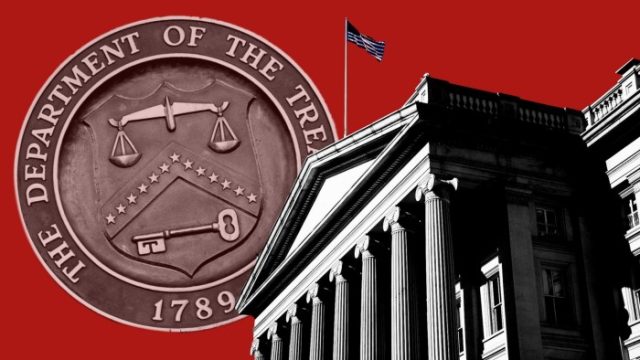Unlock the Editor’s Digest for free
Roula Khalaf, Editor of the FT, selects her favourite stories in this weekly newsletter.
Treasuries sold off on Wednesday as President Donald Trump’s tariffs took effect, deepening investor concern about the “safe haven” status of US sovereign debt.
The 10-year US Treasury yield jumped to 4.51 per cent before falling back to 4.37 per cent — up 0.11 percentage points on the day — while the 30-year yield briefly rose above 5 per cent. The 10-year yield has risen from less than 3.9 per cent earlier this week.
The moves offer a new challenge to the Trump administration, which had previously cited lowering Treasury yields as a key policy aim, and could mark a loss of investor confidence in the world’s largest sovereign debt market.
“The sell-off may be signalling a regime shift whereby US Treasuries are no longer the global fixed-income safe haven,” said Ben Wiltshire, a rates strategist at Citi.
Tuesday’s sell-off is the latest sign of investors moving out of low-risk assets and into cash, as Trump’s tariffs on major trading partners spark intense volatility in markets.
Stocks and bonds are often seen to move inversely, but futures indicate US equity markets are poised to sell off on Wednesday alongside US Treasuries. Hedge funds, which are big holders of Treasuries, are also believed to be selling.
Investors and analysts pointed to the misfiring of a popular trade that aims to exploit differences in price between Treasuries and associated futures contracts, known as the “basis trade”. As hedge funds cut back on risk and exit those trades, they have been selling Treasuries, piling pressure on markets.
Nick Lawson, chief executive of investment group Ocean Wall, said the unwinding of this trade was “putting major stress on the entire financial system.”
“Hedge funds have trillions tied up in this kind of strategy,” he said. “As things spiral, they’re being forced to sell anything they can — even good assets — just to stay afloat . . . if the Federal Reserve doesn’t step in soon, this could turn into a full-blown crisis. It’s that serious.”
One hedge fund manager said: “Those huge hedge funds with trillions of dollars of Treasuries relative value trades will blow up today if the Fed doesn’t bail them out.”
Several market participants said the situation recalled the market mayhem of March 2020, at the start of the pandemic, when a large-scale unwinding of the basis trade contributed to a “dash for cash” that sent Treasuries into freefall and forced the Fed to step in with huge bond purchases.
“Given the scale of the rout, that’s raising questions about whether the Federal Reserve might need to respond to stabilise market conditions,” said Jim Reid of Deutsche Bank. “Markets are pricing a growing probability of an emergency cut, just as we saw during the Covid turmoil and the height of the global financial crisis in 2008.”
But market participants and academics have previously warned that Fed interventions to buy bonds and save the basis trade could further incentivise highly leveraged trading because the buying acts as a floor to potential losses.
Japan’s government bond market also saw a sharp sell-off, with the 30-year yield spiking 0.3 percentage points to above 2.8 per cent, a 21-year high.
“The stock and bond vigilantes are signalling that the Trump administration may be playing with liquid nitro,” wrote macro strategist Ed Yardeni of Yardeni Research in a note.
“Something may be about to blow up in the capital markets as a result of the stress created by the administration’s trade war.”
The concern around US debt worsened after a US Treasury auction on Tuesday for three-year notes attracted the weakest demand since 2023.
Poor demand will cast a shadow over upcoming auctions this week, including the sale of $39bn of 10-year notes on Wednesday and $22bn of 30-year bonds on Thursday.
Some market participants speculated that China and others were liquidating their Treasury holdings.
“The market is now concerned about China and other countries ‘dump[ing]’ US Treasuries as a retaliation tool. Hence, UST yields up,” said Grace Tam, chief investment adviser for BNP Paribas Wealth Management in Hong Kong.
“In the short term, we expect the bond market to remain volatile given the uncertainty over tariffs, potential negotiations, and potential retaliations.”










